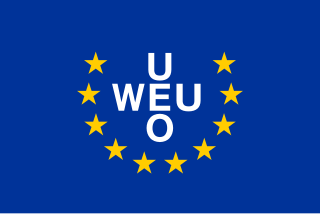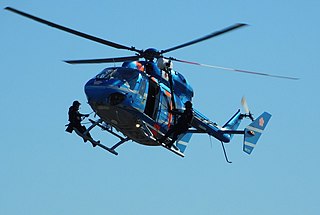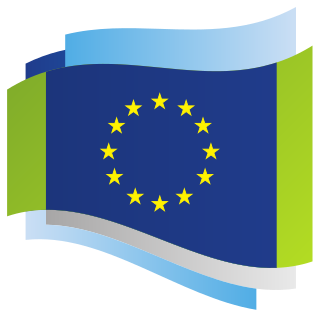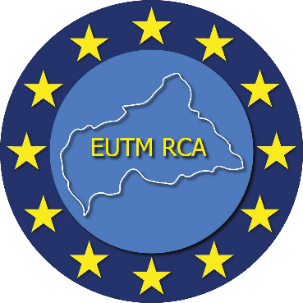
The Western European Union was the international organisation and military alliance that succeeded the Western Union (WU) after the 1954 amendment of the 1948 Treaty of Brussels. The WEU implemented the Modified Brussels Treaty. During the Cold War, the Western Bloc included the WEU member-states, plus the United States and Canada, as part of the North Atlantic Treaty Organization (NATO).
Eurocorps, located in the French city of Strasbourg (Bas-Rhin), is a multinational corps headquarters. Founded by France and Germany in 1992, it is today composed of personnel from six framework nations and five associated nations. The framework nations place the Eurocorps at the service of the European Union (EU) and NATO, which certified it in 2002 as one of its nine High Readiness Land Headquarters.

A rapid reaction force / rapid response force (RRF), quick reaction force / quick response force (QRF), immediate reaction force (IRF), rapid deployment force (RDF), or quick maneuver force (QMF) is a military or police unit capable of responding to emergencies in a very short time frame.

The Common Security and Defence Policy (CSDP) is the European Union's (EU) course of action in the fields of defence and crisis management, and a main component of the EU's Common Foreign and Security Policy (CFSP).

An EU Battlegroup is a military unit adhering to the Common Security and Defence Policy (CSDP) of the European Union (EU). Often based on contributions from a coalition of member states, each of the eighteen Battlegroups consists of a battalion-sized force reinforced with combat support elements. Two of the battlegroups were to be capable for operational deployment at any one time. The civil power that oversees these battlegroups is the Council of the European Union.

Operation Althea, formally the European Union Force Bosnia and Herzegovina (EUFOR), is a military deployment in Bosnia and Herzegovina to oversee the military implementation of the Dayton Agreement. It is the successor to NATO's SFOR and IFOR. The transition from SFOR to EUFOR was largely a change of name and commanders: 80% of the troops remained in place. It replaced SFOR on 2 December 2004.
An international decoration is a military award which is not bestowed by a particular country, but rather by an international organization such as the United Nations or NATO. Such awards are normally issued as service medals, for participation in various international military operations, and not for specific acts of heroism or bravery.

The European Defence Agency (EDA) is an agency of the European Union (EU) that promotes and facilitates integration between member states within the EU's Common Security and Defence Policy (CSDP). The EDA is headed by the EU High Representative for Foreign Affairs and Security Policy, European Commission’s Vice President (HR/VP), and reports to the Council. The EDA was established on 12 July 2004 and is based in Brussels, Belgium, along with a number of other CSDP bodies.

The Petersberg Declaration was adopted by ministers of the Western European Union on 19 June 1992 at Hotel Petersberg, near Bonn in Germany. It defined military tasks of a humanitarian, disarming, peacekeeping and peacemaking nature that the WEU would be empowered to do. The contents and responsibilities arising from the declaration, known as the Petersberg Tasks, were later transferred to the European Union's (EU) European Security and Defence Policy (ESDP), presently known as the Common Security and Defence Policy (CSDP).

The Military Staff of the European Union (EUMS) is the directorate-general of the European Union's (EU) External Action Service (EEAS) that contributes to the EU's Common Security and Defence Policy (CSDP) by providing strategic advice to the High Representative (HR/VP) and commanding operations through its Military Planning and Conduct Capability (MPCC) operational headquarters. From the end of 2020, the MPCC will be capable of running executive operations of up to 2,500 troops, i.e. the size of one EU battle group, as well as 3 non-executive missions.

The European Rapid Operational Force (EUROFOR) was a multinational rapid reaction force composed of forces from four states of the European Union: Italy, France, Portugal and Spain. It had a permanent staff capable of commanding operations, involving commitments of up to a Light Division in size. Eurofor was formed in May 1995 in Lisbon, and was answerable to the Western European Union (WEU) directly. It was tasked with performing Petersberg tasks, including humanitarian, peacekeeping and peace enforcement missions. With the merger of several WEU elements into the European Union, Eurofor had by and large become part of the Common Security and Defence Policy. It was eventually transformed into an EU Battlegroup and was on standby from 1 July until 31 December 2011. On 2 July 2012, Eurofor was dissolved.

The Berlin Plus agreement is the short title of a comprehensive package of agreements made between NATO and the EU on 16 December 2002. These agreements were based on conclusions of NATO's 1999 Washington summit, sometimes referred to as the "CJTF mechanism", and allowed the EU to draw on some of NATO's military assets in its own peacekeeping operations.

The Helsinki Headline Goal was a military capability target set for 2003 during the December 1999 Helsinki European Council meeting with the aim of developing a future European Rapid Reaction Force. There was much interest in the idea of a single EU military force, and inexact characterisations of the initiative led to imprecise journalistic depictions about a unified European army.

European Union Force Chad and the Central African Republic, also EUFOR Tchad/RCA after the French, was the European Union mission in Chad and the Central African Republic (CAR), authorised in late 2007. EUFOR Chad/CAR was authorised under the same United Nations Security Council resolution that mandated MINURCAT, a UN force tasked with training police and improving judicial infrastructure.
The European Policy Institutes Network (EPIN) is a network of 31 think tanks from most EU member states and beyond. Its main focus is on current EU and European political and policy debates. EPIN aims to contribute to the debate on the future of Europe through up to the minute, expert analysis and commentary and through providing easy access to understanding the different national debates. EPIN is coordinated by the Centre for European Policy Studies in Brussels, Belgium.

This article outlines the history of the Common Security and Defence Policy (CSDP) of the European Union (EU), a part of the Common Foreign and Security Policy (CFSP).

This article outlines the defence forces of the European Union (EU), which implement the EU's Common Security and Defence Policy (CSDP) in CSDP missions. There are two categories of EU multinational forces: ones that have been established intergovernmentally and made available to the CSDP through Article 42(3) of the Treaty on European Union (TEU), such as the Eurocorps; and the EU Battlegroups, established at the EU level.

Nicolae "Nicu" Popescu is a Moldovan author and diplomat who served as Minister of Foreign Affairs and European Integration of Moldova from 6 August 2021 until 26 January 2024 in the Gavrilita and then Recean cabinets. He was also Moldova's Foreign Minister from 11 June - 14 November 2019 in the Sandu Cabinet. Until his appointment, he was the director of the Wider Europe programme of the European Council on Foreign Relations and visiting professor at Sciences Po-Paris.

The European Union Training Mission in the Central African Republic (EUTM-RCA) is a European Union multinational training mission headquartered in Bangui, Central African Republic.












